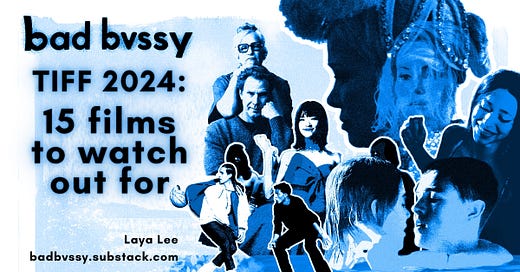TIFF 2024: 15 Films to Watch Out For
An unofficial guide on standout films for girls, gays, and geezers from this year’s Toronto International Film Festival.
This post will be cut off in your email, so remember to open in your browser or in your substack app!
TIFF24 has officially wrapped and I am officially back home in Chicago!
After a whirlwind of a fest, I’m feeling super blessed to be able to walk away with a wonderful week of amazing screenings, as well as many generative conversations with filmmakers, publicists, and film journalists alike. You can read more about my time at the festival at Hi Shelli with my introduction piece, along with some upcoming coverage of a few different films. Stay tuned for that.
Toronto International Film Festival is one of the largest public-facing film festivals in North America, with this year’s slate including 278 films across the globe.
Given its unique timing in the festival circuit, many projects premiere in Toronto with secured distributors and sales agents already attached, meaning audiences attending the festival can already have a sense of where they can next have the opportunity to watch a film they’re interested in.
Here is a compiled list of films made up of projects that I think could be contenders for awards seasons, along with movies that I think could be relevant in pop culture and cinema, and some smaller films that I think deserve some extra eyes on them.
I resent the narrative that stories centering women and other marginalized folks just don’t sell in the film market. Over the past decade, we’ve seen the canon of cinema bend and shift and twist to include unapologetic entries featuring transgressive representations of womanhood, and we’ve seen critical acclaim for these projects.
These are some films featuring layered and exciting stories about women that were amongst my favorite films at the festival — along with these selections are films that many audiences can look forward to in its thoughtful treatments of character and unique exploration of feminine sexuality, shame, and freedom.
Anora (dir. by Sean Baker)
From the director of Tangerine and The Florida Project, Anora had my absolute favorite soundtrack of any film at this year’s festival — featuring tracks from Slayyyter, t.A.T.u., Blondie, and more. Following a Russian-American stripper in Coney Island who falls in love with the son of a Russian oligarch, Anora is as much a love story as it is a cautionary tale about young women placing their trust in men they barely know. The film promises audiences a wild and hilarious romp through a zany, modern Cinderella fantasy — one that ends in a stark but down-to-earth portrait of a young woman’s yearning for security and love in an uncertain, patriarchal world. Winner of this year’s Palme D’or at Cannes Film Festival, Anora was also named as a runner-up for TIFF’s People’s Choice Award. Whether or not this means anything to you, Anora will remain one of the most talked about films of this year and is a sure-contender for awards season. Anora is being distributed by Neon and will be released in theaters on October 18.
You can read my full review of Anora at Hi Shelli.
Babygirl (dir. by Halina Reijn)
Following Bodies Bodies Bodies, Halina Reijn returns with new erotic romance Babygirl, starring Nicole Kidman and Harris Dickinson. The film centers Romy (Kidman), a CEO of a Robotics tech company, as she unleashes the floodgates of her own sexual repression by beginning a dom/sub affair of sexual powerplay with her significantly younger and aggressively-forward intern, Samuel (Dickinson). While the film’s core exists in gag-worthy hotel and office sex scenes shared between its two lead actors — it’s in Nicole Kidman’s captivating portrayal of a woman juggling sexual shame and despairing desire that the film shines. Babygirl confronts audiences with a certain type of BDSM that isn’t super groundbreaking for audiences, but places a captivating push and pull emotional journey on display, able to position us alongside the protagonist’s heterosexual and wealthy worldview – in a way that has us clutching for our pearls all the same. Would recommend this one for anyone who loves an on-screen sex scene or anyone who’s also orgasmed so hard they started sobbing. Babygirl has also been picked up by A24 (lotsa A24 picks this year, as we’ve seen) and will be released in theaters on December 25!
The Substance (dir. by Coralie Fargeat)
Demi Moore appears in the newest body horror feature The Substance, playing a fading Hollywood actress turned aerobics aficionado who, on her 50th birthday, is fired by the network. Spiraling from a world that quickly discards and forgets about her, Elizabeth Sparkle (Moore) begins injecting a black market drug labeled ‘The Substance’, promised a beauty enhancement. Thus comes the birth of Sue (Margaret Qualley), a younger and seemingly ‘more beautiful’ duplicate of herself — yet, the two’s bodies and consciousnesses are tethered as ‘one’, forced to swap out with one another. Winning ‘Best Screenplay’ at Cannes earlier this year and The People’s Choice Midnight Madness Award at TIFF, The Substance surprised a lot of audiences with a thoughtfully-crafted satire, carried by a captivating performance from Demi Moore — convincing me as a powerful project in the world of feminist body horror. The Substance has been picked up for distribution by Mubi and Metropolitan Filmexport for France. The film premieres in theaters this weekend on September 20!
The Last Showgirl (dir. by Gia Coppola)
In The Last Showgirl, Pamela Anderson returns to the silver screen in all her Pamelaissance glory — her first major leading role since releasing her memoir Love, Pamela and her biopic documentary Pamela, A Love Story. From Gia Coppola (a Coppola by a different name), The Last Showgirl follows a seasoned Las Vegas showgirl, an aging starlet, who must plan for a future she wasn’t prepared for when her show closes after a 30-year-old run. Somehow, after the very journey of public vulnerability Pamela’s been on these past couple of years, she feels like a perfect fit to steward this character and tell this story. The premise alone is captivating enough to get me to watch, yet what really makes this a must-watch for me is what Pamela Anderson has to say about the film in her interview with The Kit: “What do you do in your fifties, and you’ve kind of put your career first and you haven’t been there for your kids enough? You’re facing your adult children — we all have to face our adult children and beg for forgiveness at some point in our lives about how we did the best we could with the tools we had.” Clocking in at just under 90 minutes, The Last Showgirl just premiered in Toronto this month, but will continue its festival run this next year. Looking forward to watching it.
Nightbitch (dir. by Marielle Heller)
Amy Adams is… NIGHTBITCH. Right? Adapted from the bestselling novel, Nightbitch is an inevitable major motion picture (the execs know this, book adaptations equals $$$). Amy Adams, who won the TIFF Tribute Performer Award, plays the leading role of Mother alongside Scoot McNairy, who plays the role of Husband — yes, that’s right. New to suburban motherhood, Amy Adams’s character struggles to fit the confines of her role as a parent and wife while her husband takes frequent business trips. In struggling to find meaning in her maternal routine, she begins turning into a dog. That’s the movie.
Although I remain skeptical of the depth of what Marielle Hellers will bring to the film, I still think this film’s vague or even magical realist premise feels almost irresistible, even with some potentially corny, potentially reductive ideas surrounding feminine primality — yet I remain open to having my mind changed by the film when I get to watch it. Nightbitch has secured Searchlight Pictures as a distributor and releases in theaters on December 6.
I love stories about family — the creation of family, the unbecoming of family, or especially the work it takes to keep a family together. These are some films from TIFF’s slate that we can all look forward to finding some truth in how families and communities move together and apart — from struggling to keep themselves together, to redefining family, or looking for a new sense of belonging.
On Becoming a Guinea Fowl (dir. by Rungano Nyoni)
An uncle’s dead body acts as a rude awakening for a middle class Zambian family, whose family secrets begin to surface amidst a funeral in this surrealist dramedy from Zambian Welsh director Rungano Nyoni. I was sold on this film as soon as I read ‘family secrets’ in its synopsis (but also when I saw the film’s protagonist dressed up as Missy Elliott, a scene that kickstarts the film’s opening sequence). The film thoughtfully balances an introspective protagonist and some dark and difficult themes of abuse — so major trigger warning for anyone who has a hard time listening to stories of abuse or sexual trauma. I remain surprised and impressed by the film’s easy-going humor and the significance it finds in the role of a Guinea Fowl that becomes the film’s heart. An important watch. On Becoming a Guinea Fowl has secured distribution by A24 and will be releasing in theaters this December.
You can read my full review this week at Hi Shelli.
A Mother Apart (dir. by Laurie Townshend)
This new tender, heartfelt documentary from Toronto-based filmmaker Laurie Townshend frames motherhood as a practice, and in doing so, takes us on a journey of healing and truth-seeking. A Mother Apart follows Jamaican-American poet and LGBTQIA+ activist Staceyann Chin, whose role as a mother has taken root at the heart of her identity. As Chin supports and loves her daughter, she also investigates the whereabouts of her mysterious mother who she was abandoned by at a young age. A Mother Apart is on its festival run at the moment but has secured distribution from NFB. I’m really hoping that Americans and international audiences will get access to experience this incredible film.
Rez Ball (dir. by Sydney Freeman)
The ‘Inspiring Sports Comedy Drama’ genre is so back with Netflix’s Rez Ball. From co-writers Sterlin Harjo (Reservation Dogs) and Sydney Freeman (Marvel’s Echo, Drunktown’s Finest), the film follows an ensemble of Navajo high schoolers, their community, and their basketball team the Chuska Warriors, who tragically lose their best player and teammate at the top of the film. Following this loss, the team and characters must come together to realize their dreams of a state championship. Despite it being easy to identify the formula of sport-drama storytelling, Rez Ball surprises you with its heart and honest portrayal of Navajo youth. Director Sydney Freeland thoughtfully finds ways to weave queer stories into the film, all while maintaining focus on how hard it is to chase your dreams and not let ideas of demons of scarcity or shame sabotage your drive or self-worth. TIFF is Rez Ball’s world premiere, but the film releases in select theaters on September 20 and streams on Netflix on September 27.
You can read my review of Rez Ball at the Chicago Reader.
Dead Talents Society (dir. by John Hsu)
Taiwanese supernatural satire Dead Talents Society captures a campy, hilarious, and heart-filled world of undead spirits competing to haunt the living, fighting for their chance to be seen. With an culture and industry-like economy akin 80’s-era Taiwanese talk show hosts and idol pop performers, Dead Talents Society follows The Rookie (Gingle Wang), a recently deceased teen who learns that she only has 30 days left to scare someone and get her haunting license or else she ceases to exist. She is mentored by Catherine (Sandrine Pinna), a legendary phantom diva who’s former pupil has become her new nemesis and stolen her spotlight. With help from their agent Makoto (Bo-Lin Chen), the gaggle of ghosts end up on a comedic and heart-filled mission to turn The Rookie into a terrifying Urban Legend to climb the ranks of ghouls. At it’s heart, the film is a story about the power of found family and a reminder that you don’t need to be talented or spectacular to be special and to be loved. Dead Talents Society was named as a runner-up for TIFF’s People Choice Midnight Madness Award. Currently on its festival run, the film will next play at Fantastic Fest and the Hawaii International Film Festival. However, the film has also been picked up by Sony Pictures, so fingers crossed on streaming access or a theatrical run for those of us overseas.
The Piano Lesson (dir. by Malcolm Washington)
Adapted from the 1987 play by August Wilson, The Piano Lesson follows the Charles family and their lives, set in the aftermath of the Great Depression. At the heart of the story is their prized heirloom piano — an intricate piece of family history, which carries their family history, with carvings made from an enslaved ancestor. With a star-studded cast featuring Samuel L. Jackson, John David Washington, Michael Potts, and Erykah Badu — the film’s epic decade-spanning story is sure to carry some magnificent performances and pose some thoughtful questions about authorship, preservation of family history, and legacy. The film, produced by director Malcom Washington’s father, Denzel Washington (it’s a family affair), will next be opening the Chicago International Film Festival on October 16. The Piano Lesson also officially releases in select theaters on November 8 and will be streaming on Netflix on November 22.
We Live in Time (dir. by John Crowley)
One thing about me is I’m a hopeless Florence Pugh stan. I dunno what it is about this white girl, but I can’t not watch everything she’s in. If she can get me to watch Dune, then she can get me to watch a John Crowley film for sure.
We Live in Time is a romance film about the unpredictability of life and love. The film features Almut (Florence Pugh) and Tobias (Andrew Garfield) who fall in love following a surprise road accident that kicks off their romance. We Live in Time follows the protagonists’ journey through several decades as they seek to become parents and their efforts to keep their family together through an unexpected diagnosis. With an inventive approach to story structure, director John Crowley and screenwriter Nick Payne aim to explore what it means to make the most out of our time on this earth, promising audiences some beautiful joyful moments and tears. There will be tears when you watch this movie. The film has been picked up for distribution by A24 (US release) and StudioCanal (worldwide sales) and will premiere in theaters on October 11.
I sometimes remain critical of the use of ‘queer’ to describe all LGBTQIA2S stories — I believe that sometimes the way we use ‘queer’ may impose a limited and at-times-harmful Western lens of understanding sex and gender across cultures. Yet, one of my favorite things about ‘queerness’ is the posing of a question, as well as the space for various ideas about oneself to cohabitate without contradiction.
These films from this year’s TIFF slate fit that fit neatly into that vastness of queerness, offering up thoughtful tales of rebirth. These films feature stories of characters starting from scratch.
Emilia Pérez (dir. by Jacques Audiard)
I must honestly say that Emilia Pérez was one of the most transphobic movies I’ve seen in a long time. So why can’t I stop thinking about it? Branded as a pop opera meets narco thriller meets gender affirmation drama (okay, miss girl), Emilia Pérez is a pulpy musical opera about its titular character (Karla Sofía Gascón), a kingpin turned queenpin who fakes her death, with the help of a Mexico City defense attorney (Zoe Saldaña), to transition as a trans woman. The film is a story about rebirth, one where the topic of transition and transformation is handled so sloppily that it remains downright offensive. Yet, for what the film lacks in thoughtfulness or care regarding trans stories, it offers up instead a genuine interest in the arcs of its ensemble cast of women — all seeking to remold their lives in the face of their oppressive pasts. The film has a lot of novelty for its indulgent genre-merging and I will honestly say that I love its spectacle, its silliness, and its soap opera antics — making this a complicated addition to this list. Regardless of its problems and harmful trans tropes (referring to Emilia as half-man-half-woman, along with a sensationalized musical number about gender affirming surgeries), I’m certain this film will be at the forefront of trans cinema for the next couple of years whether we like it or not. Emilia Pérez is being distributed by both Pathé and Netflix. It will be released in theaters on November 1 and be available for streaming on Netflix on November 13 in the US, Canada, and the UK.
You can read my full review of Emilia Pérez at Hi Shelli.
Really Happy Someday (dir. by J Stevens)
Really Happy Someday is a special, unique story on transition and the work that goes into finding your voice again, both physically and spiritually. The Canadian drama centers on Z (played by Breton Lalama), a stage actor rising in Toronto’s music theatre scene, who bombs an audition, after the changes in his voice caused by Hormonal Replacement Therapy. Really Happy Someday zones in on its protagonist as he seeks support from his vocal coach Shelly (Ali Garrison) to regain control over his instrument. Though the film is a narrative piece, it is in some ways also part-documentary — featuring vocal lessons on-screen that are honest and true recordings of Lalama actually honing his voice and making strides in reclaiming agency over his voice. Directed by J Stevens, Lalama and Stevens worked together to write and produce the film together, drawing from personal experiences of navigating transition. This one’s for trans folks who are looking for their stories on screen, for theatre kids and performers alike. Really Happy Someday just premiered at this year’s TIFF, and I hope that the film continues its festival circuit around the world, so that queer audiences can find themselves on screen once more.
Will & Harper (dir. by Josh Greenbaum)
In 2022, Harper Steele sent out an email coming out as a trans woman to all of her friends, one of whom included her longtime friend and collaborator Will Ferrell. When met with shock, Will Ferrell realized that he had to learn about trans people and his old friend — so he proposed making a road trip documentary with his old friend Harper. Though it took some convincing for Harper Steele, Will & Harper is both a wholesome buddy road trip documentary, as well as a conversation starter for audiences everywhere on what trans identity is and what transition means. Harper Steele positions herself in very vulnerable positions throughout the film and in promotion of the film, allowing cis audiences a look into her life before transition and her life as a white trans woman navigating America. I don’t particularly think this film is for trans people — and neither does Harper Steele, she’s made it very clear in discussing the film: this is not a trans film, this is a Will Ferrell film about their friendship together. And while that may be true, I do think this film will go on to be incredibly significant in opening and changing moderate voters’ opinions of trans people. After all, less than 1 in 3 American voters know someone who is transgender, and while I don’t particularly find myself interested in being in dialogue with transphobes or folks who are ignorant to transness, someone has to be facilitating that dialogue — and I’m grateful it’s Will Ferrell and Harper Steele. Will & Harper is distributed by Netflix and is now in select theaters. The film will be available for streaming on Netflix on September 27.
The Paradise of Thorns (dir. by Naruebet Kuno)
One of my most anticipated releases of this year, The Paradise of Thorns is a Thai drama about an unmarried gay couple, Sek and Thongkam, whose life of tending to the durian orchard that they built together is disrupted when Sek passes in a tragic accident. Because the couple’s relationship is not recognized by the government, the durian orchard is seized by Sek’s mother. In the face of losing his life and the love of his life, Thongham fights to reclaim what he and Sek built from the ground up, unwilling to lose the last piece of his partner he has left. The Paradise of Thorns seeks to make meaning out of Thailand’s past, present, and future in the face of the country’s recently passed same-sex marriage bill, which is the first in all of Southeast Asia. Weighing grief, self-determination, freedom, and justice — the film is carried by both an incredible vision from filmmaker Naruebet Kuno and brilliant performances from Jeff Satur and Engfa Waraha. The Paradise of Thorns is distributed by GDH 559, and I’m eagerly hoping for a theatrical or streaming release here in the United States.













